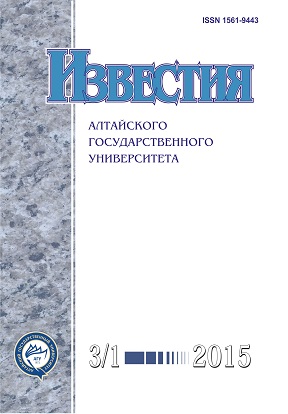The Problem of the Subject in Postmodern Philosophy: the Place of the Subject
Abstract
This article is dedicated to the problem of the subject in postmodern philosophy. Postmodernism texts prove that French postmodern philosophers do not just declare the subject’s death, but also speculate about subject’s specific way of existence. Postmodernism philosophy reveals the tendency to describe the subject as having the space characteristics (such as “point” or “center), and the subject becomes and develops the features of the subject after taking a certain place. However, despite the fact that subject’s existence depends on subject’s place, the place is never in possession of subject and never belongs to him. The place never exists as possession. Hence the subject and its place are not in possession relations. The subject is searching for its place. To become a subject, the one is required not only to take its place, but to find and keep it. The place always needs looking for, and subject is always to take it.
DOI 10.14258/izvasu(2015)3.1-39
Downloads
Metrics
References
Деррида Ж. Письмо и различие [Электронный ресурс]. - URL: http://www.gumer.info/bogoslov_Buks/Philos/ derrpism/.
Делез Ж., Гваттари Ф. Анти-Эдип: капитализм и шизофрения. - Екатеринбург, 2007.
Бодрийяр Ж. Симулякры и симуляция / пер. О.А. Печенкина. - Тула, 2013 [Электронный ресурс]. - URL: http://www.gumer.info/bogoslov_Buks/Philos/bodr_ sim/.
Бодрийяр Ж. Общество потребления. Его мифы и структуры. - М., 2006.
Фуко М. Слова и вещи. Археология гуманитарных наук [Электронный ресурс]. - URL: http://lib.ru/ CULTURE/FUKO/weshi.txt.
Фуко М. Надзирать и наказывать: рождение тюрьмы. - М., 1999.
Фуко М. Использование удовольствий. История сексуальности. - Т. 2. Фуко М. Воля к истине: по ту сторону знания, власти и сексуальности. Работы разных лет. - М., 1996.
Фуко М. Археология знания [Электронный ресурс]. - URL: http://www.gumer.info/bogoslov_Buks/Philos/ fuko_arh/01.php.
Фуко М. Что такое автор? // Фуко М. Воля к истине: по ту сторону знания, власти и сексуальности. Работы разных лет. - М., 1996.
Фуко М. Порядок дискурса // Фуко М. Воля к истине: по ту сторону знания, власти и сексуальности. Работы разных лет. - М, 1996.
Барт Р. Избранные работы: Семиотика: Поэтика. М., 1989.
Барт Р. Введение в структурный анализ повествовательных текстов [Электронный ресурс]. - URL: http://www.gumer.info/bibliotek_Buks/Literat/bart/ index.php.
Барт Р. Фрагменты речи влюбленного [Электронный ресурс]. - URL: http://www.m-kultura.ru/fragmenty-rechi-vlyublennogo/.
Деррида Ж. О грамматологии [Электронный ресурс]. - URL: http://philosophy.ru/library/derrida/gramma-tologie.html.
Izvestiya of Altai State University is a golden publisher, as we allow self-archiving, but most importantly we are fully transparent about your rights.
Authors may present and discuss their findings ahead of publication: at biological or scientific conferences, on preprint servers, in public databases, and in blogs, wikis, tweets, and other informal communication channels.
Izvestiya of Altai State University allows authors to deposit manuscripts (currently under review or those for intended submission to Izvestiya of Altai State University) in non-commercial, pre-print servers such as ArXiv.
Authors who publish with this journal agree to the following terms:
- Authors retain copyright and grant the journal right of first publication with the work simultaneously licensed under a Creative Commons Attribution License (CC BY 4.0) that allows others to share the work with an acknowledgement of the work's authorship and initial publication in this journal.
- Authors are able to enter into separate, additional contractual arrangements for the non-exclusive distribution of the journal's published version of the work (e.g., post it to an institutional repository or publish it in a book), with an acknowledgement of its initial publication in this journal.
- Authors are permitted and encouraged to post their work online (e.g., in institutional repositories or on their website) prior to and during the submission process, as it can lead to productive exchanges, as well as earlier and greater citation of published work (See The Effect of Open Access).








